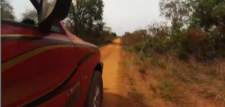
Conflict and illegal mining in Central African Republic
Central African Republic seldom makes the news but that does’t make life there any less risky—as this Bloomberg piece makes abundantly clear.
Worth a read in full, it’s an examination through the eyes of artisanal miners of how the deterioration in that country’s security situation has affected people and businesses. It’s like a depressing bingo card for things that could go wrong: conflict, illegal taxation, mine invasion, violence, blood diamonds, pit collapses and dead miners, the proliferation of weapons, illegal gold…
As the article points out, “revenue generated by illegal exports of gold, diamonds and other resources is fueling a conflict that has engulfed Central African Republic. At least 3,000 people have died, the United Nations says. More than 2.5 million need urgent humanitarian assistance and about 1 million have fled their homes to neighboring countries or camps.”
There may be some slight hope in sight, though: a UN Security Council team that began a visit to the country this week has an opportunity “to ensure that protection for civilians and justice for the “brutal killings that have ravaged” the country should be at the top of their agenda”—at least according to New York-based Human Rights Watch said in an e-mailed note.
From the article:
“Seleka [a rebel organization] controls “swathes of territory” in Central African Republic’s gold- and diamond-producing regions in the east… One of the militia’s main demands at the start of its rebellion in 2012 was the restitution of gold and diamonds “stolen” by Bozize’s regime, the Antwerp, Belgium-based research group said. Government officials and soldiers were deployed to mining areas in 2008 and confiscated diamonds, it said.
General Audarrassa Mahamat, military coordinator of the Union for Peace in the Central African Republic, a faction of Seleka, denied his soldiers were taxing the workers illegally.
Food, Security
“We don’t take the diamonds or gold,” he said without flinching at the sound of heavy artillery outside his Bambari compound. “The workers give the soldiers money for food and security.”
Mahamat declined to answer repeated questions about the taxes buyers and traders have to pay.
The mine around which this article is centred was previously licensed to Toronto exploration outfit Axmin Inc. but as far back as December 2012 the company “suspended operations at the camp, where it had planned to start producing 200,000 ounces of gold a year, describing the situation in a statement as a “Force Majeure” due to the sectarian violence. Now the mine is a hive of activity, with diggers dotted all over the dusty, yellow-tinged hillside.”
More here. Depressing but worth a read for insight into how, and how badly, things can go wrong.
ENDS
www.bloomberg.com/news/articles/2015-03-08/blood-gold-exports-pour-illeg...
IMAGE: still from article video





